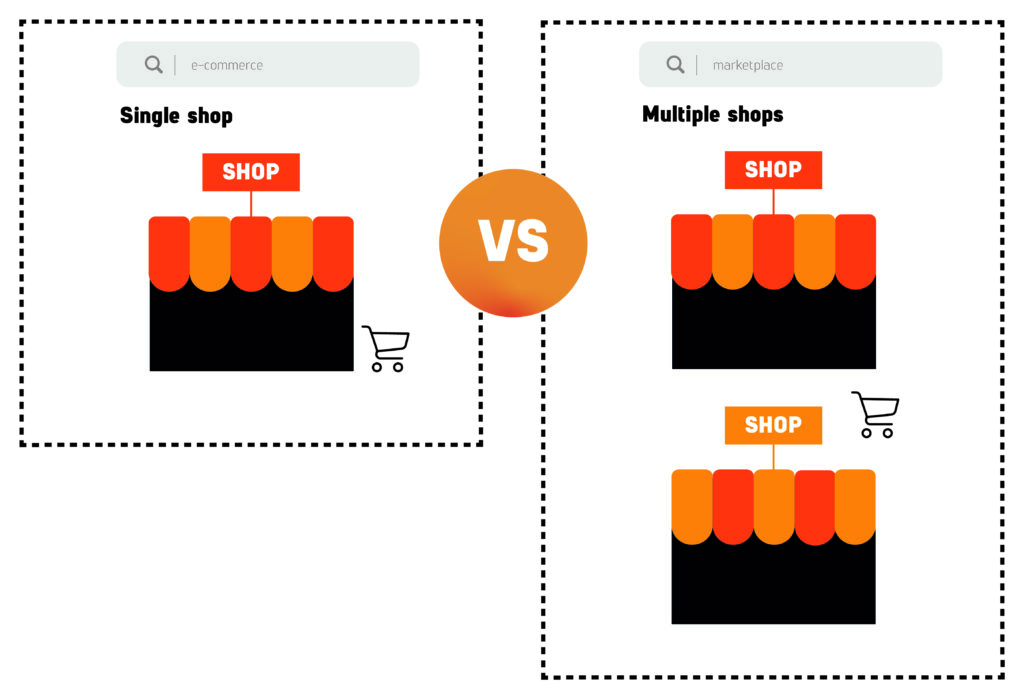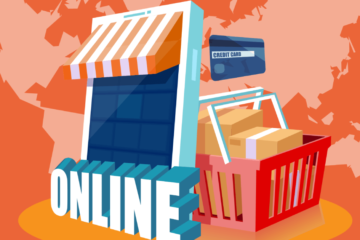
Nowadays we are more than used to shopping online, both for personal life and at work.
When we think about buying and selling online, we usually think about online shops (ecommerce). However, in recent years, the emergence of marketplaces has been growing, in part due to the demand for larger audiences, simplification of shop creation processes, and search for alternative online sales channels. But what is the difference between them? See this comparison of Marketplace vs Ecommerce Shops.
In this article we will touch the basic concepts of marketplace vs ecommerce shops, identify their main differences, and explain how sellers can benefit from one and other.
Differences and Benefits:
Both ecommerce and marketplace are online business models that are based on transactions between sellers and buyers.
An ecommerce shop represents a single company, i.e. a single seller who owns the business. In this type of model, the company sells its stock directly to the customer. A marketplace, on the other hand, brings together several sellers on a single platform, where various products from different shops are brought together, offering a much wider range of products.

Let’s take a closer look at the differences and how business can benefit from one and other.
Customization
– By creating the shop from scratch, you will have the possibility to customize and make everything according to your preference. This is an important point and something you need to consider before start.
– In a marketplace, there will be less customization of your ecommerce shop. Also, keep in mind that you will have to obey the rules of the marketplace, for example, regarding product descriptions or picking times.
Traffic
– Any online business has its target audience. In an online shop, the seller must perform actions to attract traffic to his online shop either organically or through digital marketing actions. Implementing these actions and working on the shop’s reach may require for example subcontracting marketing agencies. Before creating your shop, you should consider these future costs.
– In a Marketplace, generally, attracting traffic is a responsibility of the marketplace itself, either organically or through digital marketing actions. Still, by offering a larger portfolio of products and brands, marketplaces can attract a larger audience. You may be wondering “But if marketplaces have several sellers, maybe the audience they attract is not of my interest”. Correct, but nowadays, there are several niche marketplaces that work in specific sectors, so the traffic they attract can be as specific as your online shop, but in larger scale.
Marketing
– This point is related to the previous one. As we mentioned, in traditional ecommerce shops, the seller is responsible for attracting traffic, he is also responsible for working on their notoriety and credibility, generating leads, and nurturing them, following up the purchase process through email marketing flows and perform other actions to allow buyers to return to the shop.
– In marketplaces, is given support to sellers to perform these marketing actions. This support might mean helping or executing the actions described above. You should have in mind that each marketplace has specific rules, some may have actions integrated into the contracted fees, others may charge separately for these services.
Logistics
– An online shop requires the creation and management of logistics processes such as warehousing, shipment preparation, stock management, transport scheduling and tracking of orders until they delivered to the buyer’s facilities. Depending on the size of the shop, all this process requires manpower to ensure a logistical operation of the orders.
– Marketplaces, depending on the model, does not solve all of the logistical problems, but they certainly may offer a range of parameterized transport methods for any part of the country in which they operate. Also, usually orders are tracked by the marketplace team, until the delivery to the buyer and any conflict in the process is solved by this team. Here, the seller’s involvement is far less and represents a significant saving in time and resources.
Investment
– Creating and managing an online shop requires investment, both in manpower and in creating and managing processes. Keep in mind the time you will need to put all the processes in place. This is also a cost and can be time-consuming.
– Selling products on a marketplace, requires much less cost and the set-up of the shop is usually quick and easy. The management of the various operations is simplified, i.e. you do not need the same number of employees. All the costs of creating and managing an online shop in the marketplace almost don’t exist. The only investment you will make, is the contractual fee to be part of the marketplace. The payment models will differ from marketplace to marketplace.
It is not always easy to decide which way to go. The decision between ecommerce shop and marketplace should start by understanding your needs, your type of business, the audience you want to reach, a broad market or a more specific one. After that, evaluate the costs for activity regarding creating and managing the shop, to make the most appropriate decision.
There is no such thing as the right one, so it is important to understand each business activity. Marketplace and ecommerce are here to stay and to help companies in their way to digital transformation!
If you’re looking for a Marketplace focused in telecom equipment, have a look at Twoosk and the benefits this platform can have for your business.
Related articles: 5 Tips to Create a Successful B2B online shop on the Telco Marketplace










